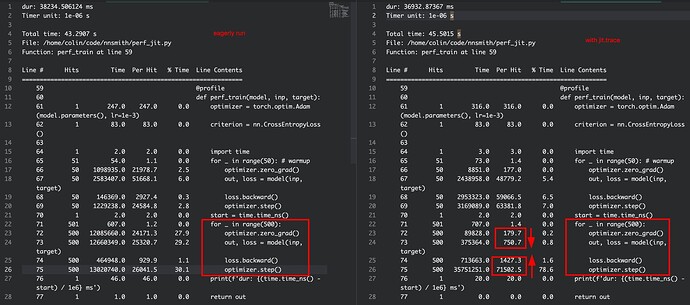Hi all! I am trying to use JIT to speed up my training. However, when profiling my code with JIT trace, I found that while zero_grad and forward are much more faster than the case without JIT, backward and optimizer.step become slower. Why this happened? I am also wondering whether JIT compiler has some optimizations for backward and optimizer.step. I tried to search on the Internet but found nothing about this.
Profiling result:
Code to reproduce this:
import torch
import torch.nn as nn
from IPython import embed
def profile(func):
from line_profiler import LineProfiler
def wrapper(*args, **kwargs):
lp = LineProfiler()
lp_wrapper = lp(func)
result = lp_wrapper(*args, **kwargs)
lp.print_stats()
return result
return wrapper
class MyModule(nn.Module):
def __init__(self):
super().__init__()
self.layers = nn.Sequential(
nn.Conv2d(3, 64, 3, 1, 1),
nn.BatchNorm2d(64),
nn.ReLU(),
nn.Conv2d(64, 64, 3, 1, 1),
nn.BatchNorm2d(64),
nn.ReLU(),
nn.Conv2d(64, 32, 3, 1, 1),
nn.BatchNorm2d(32),
nn.ReLU(),
nn.AvgPool2d(2, 2),
nn.BatchNorm2d(32),
nn.ReLU(),
nn.Flatten(),
nn.Linear(32*64*64, 128),
nn.BatchNorm1d(128),
nn.ReLU(),
nn.Linear(128, 8),
)
self.loss_fn = nn.CrossEntropyLoss()
def forward(self, x, target):
x = self.layers(x)
return x, self.loss_fn(x, target)
@profile
def perf_train(model, inp, target):
optimizer = torch.optim.Adam(model.parameters(), lr=1e-3)
criterion = nn.CrossEntropyLoss()
import time
for _ in range(50): # warmup
optimizer.zero_grad()
out, loss = model(inp, target)
loss.backward()
optimizer.step()
start = time.time_ns()
for _ in range(500):
optimizer.zero_grad()
out, loss = model(inp, target)
loss.backward()
optimizer.step()
print(f'dur: {(time.time_ns() - start) / 1e6} ms')
return out
def eager(perf_func):
device = torch.device('cuda')
mod = MyModule().to(device)
inp = torch.randn(128, 3, 128, 128).to(device)
target = torch.randint(0, 8, (128,)).to(inp.device)
out = perf_func(mod, inp, target)
# print(out.shape)
def trace(perf_func):
device = torch.device('cuda')
mod = MyModule().to(device)
inp = torch.randn(128, 3, 128, 128).to(device)
target = torch.randint(0, 8, (128,)).to(inp.device)
traced = torch.jit.trace(mod, (inp, target))
out = perf_func(traced, inp, target)
# print(out.shape)
# run one of them each time
# eager(perf_train)
trace(perf_train)
